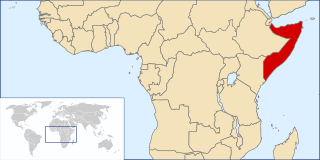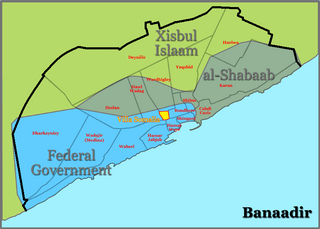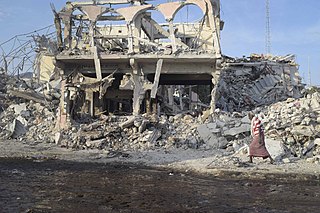
The African Union Mission in Somalia (AMISOM) was a regional peacekeeping mission operated by the African Union with the approval of the United Nations Security Council. It was mandated to support transitional governmental structures, implement a national security plan, train the Somali security forces, and to assist in creating a secure environment for the delivery of humanitarian aid. As part of its duties, AMISOM supported the Federal Government of Somalia's forces in their battle against Al-Shabaab militants.

The 2009 timeline of events in the Somalia War (2006–2009) during January 2009 is set out below. From the beginning of February the timeline of events in the Somali Civil War (2009–present) is set out following the conclusion of the previous phase of the civil war.

The Somali civil war (2009–present) is the ongoing phase of the Somali civil war which is concentrated in southern and central Somalia. It began in late January 2009 with the present conflict mainly between the forces of the Federal Government of Somalia assisted by African Union peacekeeping troops and al-Shabaab militants who pledged alliegence to al-Qaeda during 2012.
Two large-scale attacks against AMISOM soldiers carried out by al-Shabaab suicide bombers in Mogadishu, Somalia occurred in 2009. In total 32 people, including 28 AMISOM soldiers, were killed and 55 people were injured.

The Battle of Mogadishu (2009) started in May with an Islamist offensive, when rebels from al-Shabaab and Hizbul Islam attacked and captured government bases in the capital of Mogadishu. The fighting soon spread, causing hundreds of casualties, and continued on at various levels of intensity until October. The battle's name usually includes the year, when referenced, in order to distinguish it amongst the nine major Battles of Mogadishu during the decades long Somali Civil War.

The 2009 Hotel Shamo bombing was a suicide bombing at the Hotel Shamo in Mogadishu, Somalia, on 3 December 2009. The bombing killed 25 people, including three ministers of the Transitional Federal Government, and injured 60 more, making it the deadliest attack in Somalia since the Beledweyne bombing on 18 June 2009 that claimed more than 30 lives.

The Battle of Mogadishu (2010–11) began on 23 August 2010 when al-Shabaab insurgents began attacking government and African Union Mission to Somalia (AMISOM) positions in the Somali capital of Mogadishu. Al-Shabaab began its offensive after its spokesman said the group was declaring a "massive war" on troops sent by AMISOM, describing its 6,000 peacekeepers as "invaders". In December 2010 the number of AMISOM troops was increased to 8,000 and later to 9,000. The battle's name usually includes the years, when referenced, in order to distinguish it amongst the nine major Battles of Mogadishu during the decades long Somali Civil War.

On 11 July 2010, suicide bombings were carried out against crowds watching a screening of the 2010 FIFA World Cup Final at two locations in Kampala, the capital city of Uganda. The attacks left 74 dead and 85 injured. Al-Shabaab, an Islamist militia based in Somalia that has ties to al-Qaeda, claimed responsibility for the blasts as retaliation for Ugandan support for AMISOM. In March 2015, the trial of 13 Kenyan, Ugandan and Tanzanian alleged perpetrators of the bombings began at the High Court of Uganda.
The Muna Hotel in the Somali capital of Mogadishu was attacked by al-Shabaab fighters on 24 August 2010. The hotel was known to host government officials and other politicians. More fighting in the city began on 23 August.

This is a 2011 timeline of events in the Somali Civil War (2009–present).

This is a 2012 timeline of events in the Somali Civil War (2009–present).

This is a 2015 timeline of events in the Somali Civil War (2009–present).
This article contains a timeline of events for the Somali jihadist group al-Shabaab.

This is a 2010 timeline of events in the Somali Civil War (2009–present).
An attack occurred on 21 January 2016 in Mogadishu, Somalia. Al-Shabaab drove a suicide car bomb at the gate of the Beach View Café, a seafood restaurant overlooking the city's Lido Beach. Another blast struck about an hour later as government soldiers laid siege to the restaurant. After the blasts, militants entered the building, some of them by boat, and attacked civilians within. About 20 people were killed and 17 others wounded. Several perpetrators were also killed and one was arrested.

This is a 2016 timeline of events in the Somali Civil War (2009–present).

On 14 October 2017, two truck bombings took place in Mogadishu, the capital of Somalia, killing at least 587 people and injuring 316 others. Almost all of the casualties were caused by one of the trucks, which detonated when the driver, while attempting to escape from security officials, crashed through a barrier and exploded in the Hodan District, destroying a hotel. The intended target of the attack is believed to have been a secure compound housing international agencies and troops. The second blast happened close by, killing two people. A third explosives-laden truck was captured by police.
On 18 January 2020, a suicide car bombing killed four and injured at least 20 others in Afgooye, approximately 30 kilometres (19 mi) from the Somali capital, Mogadishu. Most of the casualties were police officers protecting Turkish contractors building a road. The al-Qaeda-linked extremist group al-Shabaab claimed responsibility for the attack.
On 23 March 2022 in Somalia, a series of coordinated attacks by al-Shabaab jihadists in the two cities of Mogadishu and Beledweyne killed over 60 people.

On 29 October 2022, 121 people were killed and over 300 were injured by a double car bombing in Somalia's capital, Mogadishu. President Hassan Sheikh Mohamud accused Sunni jihadist group al-Shabaab of carrying out the attacks, which they admitted. The bombing marks the deadliest attack in Somalia since the 14 October 2017 Mogadishu bombings at the same junction.
 Somalia President Sharif Sheikh Ahmed said in a statement: "I am extremely shocked and saddened by this cruel and inhumane act of violence against the most vulnerable in our society". His communications director, Suldan Sarah, said: "To do a cowardly act like that does not mean you are a force to be reckoned with. It just means you can commit a mass murder using a suicide bomber. This is not the sign of strength, but rather a cowardly act."
Somalia President Sharif Sheikh Ahmed said in a statement: "I am extremely shocked and saddened by this cruel and inhumane act of violence against the most vulnerable in our society". His communications director, Suldan Sarah, said: "To do a cowardly act like that does not mean you are a force to be reckoned with. It just means you can commit a mass murder using a suicide bomber. This is not the sign of strength, but rather a cowardly act." UN – Secretary-General Ban Ki-moon's spokesman Martin Nesirky said: "it is incomprehensible that innocents are being senselessly targeted. The secretary-general is appalled by the vicious suicide bomb attack targeting government offices and ministries in Mogadishu today." [11]
UN – Secretary-General Ban Ki-moon's spokesman Martin Nesirky said: "it is incomprehensible that innocents are being senselessly targeted. The secretary-general is appalled by the vicious suicide bomb attack targeting government offices and ministries in Mogadishu today." [11]  Turkey – Prime Minister Recep Tayyip Erdoğan called Ahmed and offered to bring the wounded from the bombing to Turkey for medical treatment. [14]
Turkey – Prime Minister Recep Tayyip Erdoğan called Ahmed and offered to bring the wounded from the bombing to Turkey for medical treatment. [14]  United States – White House's spokesman Jay Carney condemned the attacks saying: "Those killed in the 'despicable and cowardly act' included students taking an exam in hopes of getting scholarships to study abroad." [15]
United States – White House's spokesman Jay Carney condemned the attacks saying: "Those killed in the 'despicable and cowardly act' included students taking an exam in hopes of getting scholarships to study abroad." [15] 










